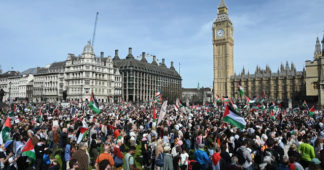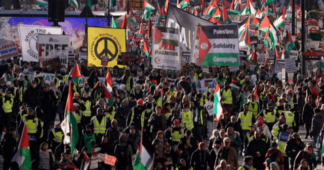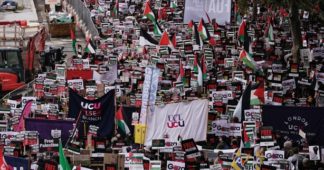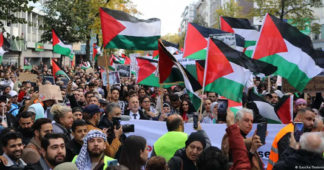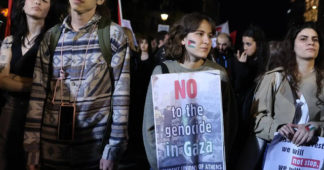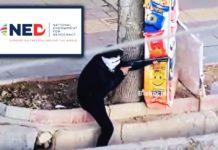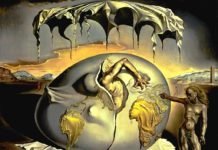Veteran UK MPs are set to be interviewed under caution after mass arrests at a demonstration in central London
Jan 19, 2025
Prominent British MPs Jeremy Corbyn and John McDonnell are due to be questioned by the police under caution on Sunday following a pro-Palestine protest the previous day that led to numerous arrests.
According to a report by the BBC, Corbyn, the former Labour leader, and McDonnell, his former shadow chancellor, agreed voluntarily to attend a police station in central London.
This follows 77 arrests made during Saturday’s protest after the police accused demonstrators of breaking through a police cordon in Trafalgar Square. The Organisers denied the claims.
The Met said on Sunday that 24 people had been released on bail, while 48 remained in custody. Ten people charged are due to appear in court in the coming days.
The Met added that a “75-year-old, 73-year-old and 61-year-old will be interviewed by officers this afternoon” under criminal caution.
Among those arrested on Saturday was Chris Nineham, the vice-chair of the Stop the War Coalition, who served as the chief steward for the national protest for Palestine.
Footage taken by Middle East Eye showed police officers in riot gear surrounding Nineham and bundling him into the back of a police van.
The arrest was made shortly after a small group of protesters left Whitehall to lay flowers in Trafalgar Square in commemoration of the deaths of Palestinian children.
Crowds could be heard shouting “shame on you” and “free, free Palestine” at the police as they detained Nineham.
The Met said it was launching an investigation and claimed there was a “coordinated effort led by the protest organisers to march out of Whitehall in a clear breach of the conditions”.
“There is video footage of one of the organisers clearly inciting the crowd to join a march, and one of the organisations involved has released a statement this evening confirming as much,” said Commander Adam Slonecki, who led the policing operation.
Tensions ran high on Saturday after the police attempted to impose last-minute restrictions on the protest despite organisers approving the route with the police months in advance.
A coalition of advocacy groups, which includes the Palestine Solidarity Campaign (PSC), the Muslim Association of Britain (MAB), the Palestinian Forum in Britain (PFB), the Stop the War Coalition (StWC) and Friends of Al-Aqsa (FOA), publicly announced the march’s original route on 30 November.
Key restrictions imposed by the police included a ban on beginning the march outside the BBC, citing concerns about its proximity to a synagogue.
Organisers reject police narrative
On Saturday, protest organisers said coalition leaders, several speakers and members of the Jewish Bloc would walk silently towards the BBC.
The plan was to lay flowers as a symbolic gesture to condemn what they described as the BBC’s complicity in its Gaza coverage.
McDonnell pushed back on police claims that protesters had “forced through” a cordon and said officers had allowed them to go as far as Trafalgar Square before dispersing.
“I spoke at demo [sic] and was part of a procession of speakers aiming to go to BBC to lay flowers commemorating the death of Palestinian children.
“We did not force our way thru [sic], the police allowed us to go thru and when stopped in Trafalgar Square, we laid our flowers down and dispersed,” McDonnell wrote on X.
Over 100,000 protesters gathered in Central London for a pro-Palestine march despite stringent restrictions by the Met Police.
The demonstration took place ahead of a ceasefire set to begin in Gaza on Sunday. pic.twitter.com/hWrOtYPKve
— Middle East Eye (@MiddleEastEye) January 19, 2025
Corbyn also denied the police claims, stating it was “not an accurate description of events at all”.
“I was part of a delegation of speakers who wished to peacefully carry and lay flowers in memory of children in Gaza who had been killed,” the former Labour leader said on X.
“This was facilitated by the police. We did not force our way through.”
Both Corbyn and McDonnell sit in the House of Commons as independent lawmakers. Corbyn quit the Labour Party after having the whip withdrawn over his response to allegations of antisemitism, while McDonnell was suspended for defying the party during a vote on child poverty.
The original route of Saturday’s march, which organisers say drew 100,000 protesters, was set to begin outside the BBC headquarters and proceed to Whitehall, where Downing Street and other government offices are located.
Demonstrators said they wanted to “protest against the pro-Israel bias” of the BBC’s coverage of Gaza.
However, the Metropolitan Police altered the route after objections from pro-Israel groups, Chief Rabbi Ephraim Mirvis and several MPs.
The coalition went back and forth with the police over restrictions and routes, with many MPs, celebrities and prominent figures condemning the restrictions.
The PSC said that the police promoted a “misleading narrative” about Saturday’s events.
It said the police had imposed “a series of complex restrictions” on protesters at very short notice.
In protest against these restrictions, “a delegation of organisers and rally speakers – including an 87-year-old Jewish Holocaust survivor, politicians including MPs, and prominent cultural figures – would walk silently and peacefully towards the BBC,” the PSC said.
The group said that the delegation expected to be stopped by the police, at which point protesters planned to leave flowers at the feet of officers and disperse peacefully.
Upon reaching Trafalgar Square and awaiting a decision from the police on whether they could proceed, “the police violently and for no apparent reason” arrested Nineham, the PSC said.
Following the arrest, flowers were laid and the delegation dispersed.
“At no stage was there any organised breach of the conditions imposed by the police. There is a large amount of video evidence confirming all of these events.”
Khalid Abdalla, a British actor who joined the protest, said the police behaved in an “aggressive and intimidating” manner.
The Jewish Bloc, which plays a major part in marches and demonstrations, also released a statement against the Met’s move, garnering over 1,000 signatories.
We remind our readers that publication of articles on our site does not mean that we agree with what is written. Our policy is to publish anything which we consider of interest, so as to assist our readers in forming their opinions. Sometimes we even publish articles with which we totally disagree, since we believe it is important for our readers to be informed on as wide a spectrum of views as possible.
